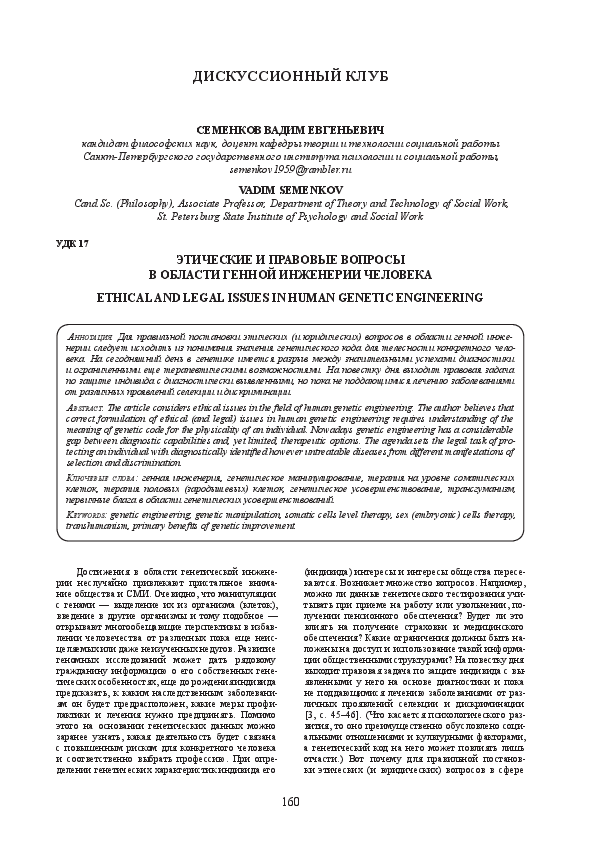Ethical and legal issues in human genetic engineering
Vol. 24 Iss. 2 pp. 160–168 | St. Petersburg State Institute of Psychology and Social Work | ISSN: 1993-8101
Abstract
The article considers ethical issues in the field of human genetic engineering. The author believes that correct formulation of ethical (and legal) issues in human genetic engineering requires understanding of the meaning of genetic code for the physicality of an individual. Nowadays genetic engineering has a considerable gap between diagnostic capabilities and, yet limited, therapeutic options. The agenda sets the legal task of protecting an individual with diagnostically identified however untreatable diseases from different manifestations of selection and discrimination.
Keywords
genetic engineering, genetic manipulation, somatic cells level therapy, sex (embryonic) cells therapy, transhumanism, primary benefits of genetic improvement
Citation
Semenkov V. E'ticheskie i pravovye voprosy v oblasti gennoj inzhenerii cheloveka [Ethical and legal issues in human genetic engineering]. Uchenyye zapiski Sankt-Peterburgskogo gosudarstvennogo instituta psikhologii i sotsialnoy raboty — Scientifc Notes Journal of St. Petersburg State Institute of Psychology and Social Work, 2015, 24, 2, pp. 160–168 (in Russian)
Citation — Harvard Notation
Semenkov, V.E. (2015), "Ethical and legal issues in human genetic engineering", Uchenyye zapiski Sankt-Peterburgskogo gosudarstvennogo instituta psikhologii i sotsialnoy raboty, vol. 24, no. 2, pp. 160–168
References
- Barbuor I. Ethics in an age of technology: the Gifford lectures, 1989-1991. Vol. 2. Harper Collins Publ., 1998. [Rus. ed.: Barbur I. Etika v vek tekhnologii. Moscow: Biblical Institute of Theology of St. Apostle Andrew Publ., 2001. 380 p.].
- Ivanenkov S.P., Kuszhanova A.Zh. Rodina kak tsennost u sovremennoy rossiyskoy molodezhi [Native land as value beside modern Russia of the young people]. Credo new, 2002, 29 (1), pp. 81-93 (in Russian).
- Leksikon. Diskussionnye temy i neodnaznachnye terminy v sfere semyi, zhizni i etiki [Lexicon. Discussion topics and ambiguous terms in the sphere of family life and ethics]. Baranov I., Basiy O. (eds.). Moscow: Frantsiskantsev Publ., 2009. 1112 p. (In Russian).
- Letov O.V. Bioetika i sovremennaya meditsina [Bioethics and modern medicine]. Moscow: Institute for Scientific Information on Social Sciences of the Russian Academy of Sciences Publ., 2009. 253 p. (In Russian).
- Rybin V.A. Evtanaziya. Meditsina. Kultura: Filosofskiye osnovaniya sovremennogo sotsiokulturnogo krizisa v medico-antropologicheskom aspekte [Euthanasia. Medicine. Culture: The philosophical foundations of modern social and cultural crisis in medical and anthropological aspect] Moscow: Librokom Publ., 2014. 328 p. (In Russian).
- Sgreccia E., Tambone V. Manuale di bioetics. EARCB, 2001 [Rus. ed.: Sgrechcha E., Tambone V. Bioetika [Bioethics]. Moscow: Biblical Institute of Theology of St. Apostle Andrew Publ., 2002. 417 p.].
- Uchenye, politiki i obshchestvennye deyateli ob ideyakh transgumanizma [Scientists, politicians, and public figures on ideas of transhumanism] (in Russian). Available at: http://transhumanism-russia.ru/content/view/25/110/ (accessed 04.12.2015).
- Fukuyama F. Our posthuman future. Farrar Straus & Giroux, 2002. 256 p. [Rus. ed.: Fukuyama F. Nashe postchelovecheskoye budushcheye. Levin M.B. (ed.). Moscow: AST Publ., 2008, 349 p.].
- Chetverikova O.N. Diktatura “prosveshchennykh”: dukh i tseli transgumanisma [The dictatorship of the "enlightened ones”: the spirit and the purpose of transhumanism]. Moscow: Blagosloveniye Publ., Tekhinvest-3 Publ., 2015. 160 p. (In Russian).
- Yankovskiy N.K. GenEtika: chto zabotit Yevropu, a chto – Rossiyu? [GenEthics: what Europe cares about, and what - Russia?]. Khimiya i zhizn - Chemistry and Life, 2000, 8 (428), pp. 12-14 (in Russian).
- Habermas J. The future of human nature. Polity Press, 2003. 136 p.
- Savulescu J. Procreative beneficence: why we should select the best children? Bioethics. 2001, 15 (5-6), pp. 413-426.

[Translate to English:]